6 Protein Powders Experts Say to Avoid Right Now
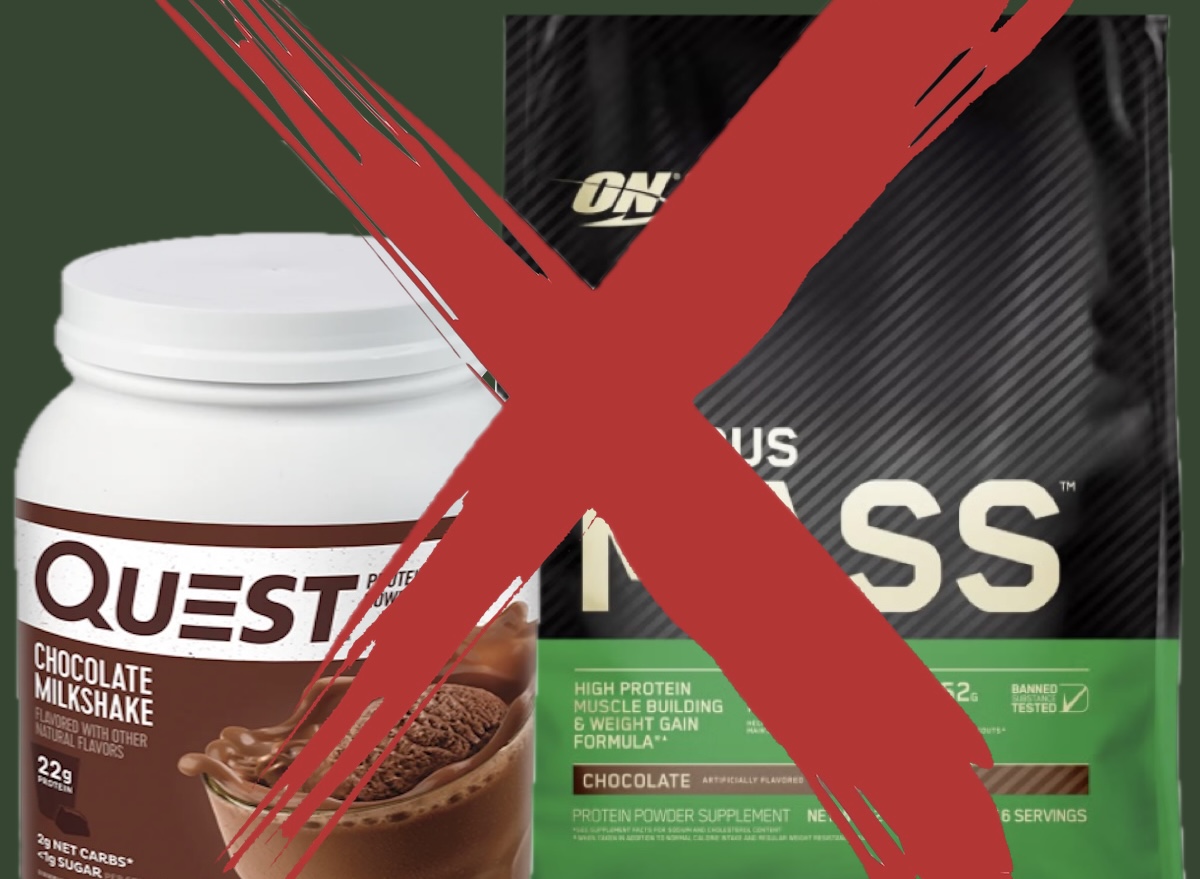
Protein powders are a go-to for gym junkies, fitness enthusiasts and anyone trying to get in their daily protein. While it gives a quick nutritional boost, not all protein powders are as clean and healthy as they seem. Many are marketed as beneficial for muscle building and meal replacements, but some popular options are packed with questionable additives that could do more harm than good. From artificial sweeteners and fillers to heavy metals and hidden chemicals, here are six protein powders with ingredients worth a second look before scooping into your next shake, according to Violeta Morris, MS, RDN from Columbus, OH, The Concierge Dietitian.
Garden of Life Organic Meal Replacement Protein Powder in Chocolate
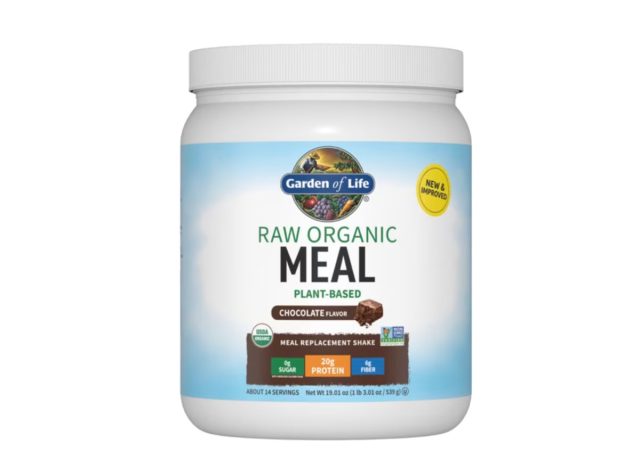
Calories: 150 calories
Fat: 2.5 g (Saturated fat: .5 g)
Sodium: 310 mg
Carbs: 12 g (Fiber: 6 g , Sugar: 0 g)
Protein: 20 g
Garden of Life’s Raw Organic Meal Replacement Protein Powder in Chocolate is one to steer clear of for a few reasons, according to Morris. “The Clean Label Project, a non-profit dedicated to consumer safety, analyzed 160 protein powders from 70 top-selling brands and flagged this product early in their findings,” Morris says. “The report focused on the presence of heavy metals (such as lead, arsenic, and cadmium), pesticides, contaminants like BPA, and the overall nutritional makeup of the powders.” She explains, “Surprisingly, organic protein powders were found to contain nearly twice the levels of heavy metals compared to non-organic varieties. Chocolate-flavored powders, in particular, were shown to contain up to four times more lead than vanilla flavors, according to data from Texas Health.”nAs a result she cautions people to rethink when buying multi-ingredient protein powder marketed for meal replacement, weight loss, or performance. She says, “Garden of Life’s Raw Organic Meal Replacement Protein Powder – Chocolate includes not only a blend of 44 superfoods, probiotics, and enzymes, but also erythritol, a sugar alcohol that can lead to digestive discomfort such as bloating and gas in some people.”
Quest Chocolate Milkshake Protein Powder
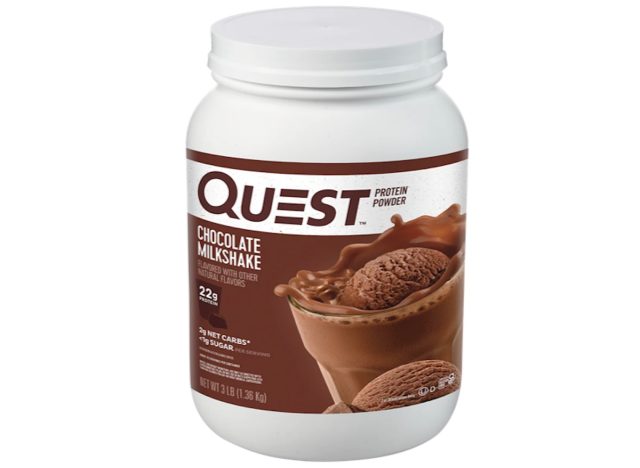
Calories: 110
Fat: .5 g (Saturated fat: .5 g)
Sodium: 120 mg
Carbs: 3 g (Fiber: 1 g , Sugar: <1 g)
Protein: 22g
Quest Chocolate Milkshake Protein Powder looks like a decadent chocolate shake but with health benefits, however, Morris warns not to be misled. “Quest Chocolate Milkshake Protein Powder was flagged by The Clean Label Project as one of the lower-rated products,” she says. “While its nutrition label looks solid—offering 110 calories, 3 grams of carbohydrates, and 22 grams of protein per scoop—the concern lies in its lack of third-party testing and quality assurance.” She explains, “This means there’s no independent verification from organizations like NSF or USP to confirm the purity and accuracy of its ingredients. Additionally, chocolate-flavored powders have been found to contain higher levels of heavy metals compared to vanilla flavors.” Morris adds, “If you prefer the brand, I’d suggest opting for their vanilla version and encouraging the company to seek third-party testing to build consumer trust. As a dietitian, I recommend being cautious with any product that lacks external validation, even if the nutrition facts appear ideal.”
Optimum Nutrition Serious Mass – Chocolate
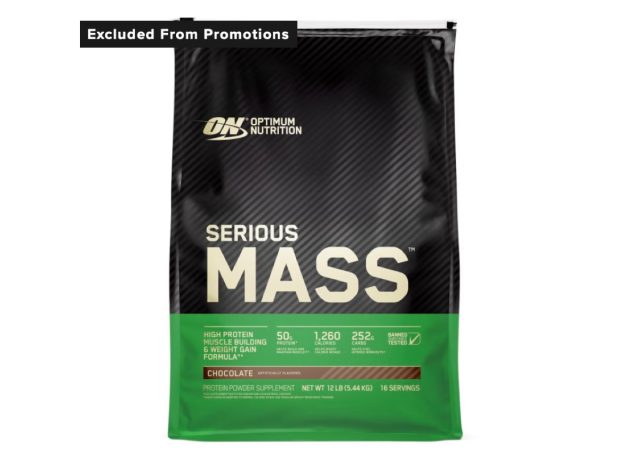
Calories: 1,260
Fat: 6 g (Saturated fat: 3.5 g)
Sodium: 650 mg
Carbs: 252 g (Fiber: 4 g , Sugar: 29 g)
Protein: 50 g
Optimum Nutrition Serious Mass–Chocolate is one that Morris always tells her clients to skip because of the high calories and sugar content. One serving (2 scoops) delivers a staggering 1,260 calories, 251 grams of carbohydrates, 50 grams of protein, and 29 grams of sugar. “As a dietitian, the biggest red flag is the excessive carbohydrate and sugar content, which can lead to blood sugar spikes and unwanted fat gain—even in individuals without diabetes,” Morris explains. “While it’s marketed as a mass gainer, this is not a healthy or balanced approach to weight gain.” In addition, another concern Morris has “is the lack of third-party testing, which raises questions about the accuracy and safety of the listed ingredients. For most people, the long-term health risks of regularly consuming a product like this outweigh any short-term muscle-building benefits.”
Vega Sport Plant-Based Vanilla Performance Protein
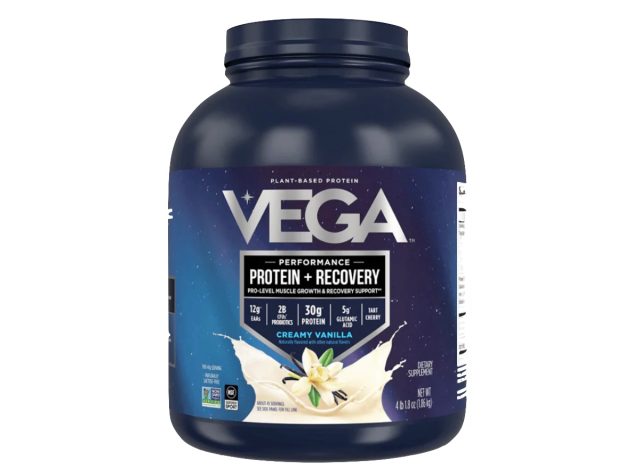
Calories: 180 calories
Fat: 3.5 g (Saturated fat: 1 g)
Sodium: 530 mg
Carbs: 6 g (Fiber: 2 g , Sugar: 1 g)
Protein: 30 g
Vega Sport Plant-Based Vanilla Performance Protein is another powder Morris avoids. “It’s ranked near the bottom on The Clean Label Project’s list,” she says. “Each scoop contains 180 calories, 3.5 grams of fat, 6 grams of carbohydrates, and 30 grams of protein — a solid nutrition profile for those looking to supplement with protein. It also carries NSF Certified for Sport, which is a respected third-party certification.” She adds, “However, despite its strong nutrition label and NSF certification, it was still flagged in The Clean Label Project’s testing. As a dietitian, I urge caution with any protein powder, especially plant-based options, due to concerns about contamination.” Morris explains that “The Clean Label Project found that 75% of the plant-based protein powders they tested contained detectable levels of lead, with many ranking lower in purity than whey-based (dairy) protein products. While plant-based proteins can be a great option, this report highlights the need to be selective and informed about the brands we trust.”
Javyy Original Protein Coffee
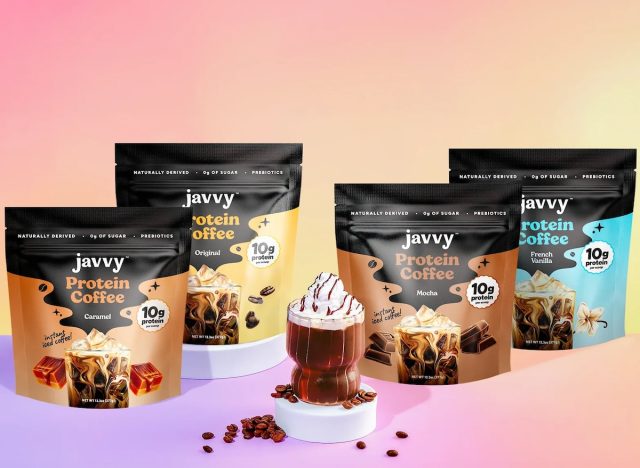
Calories: 70
Fat: 1 g (Saturated fat: .5 g)
Sodium: 75 mg
Carbs: 5 g (Fiber: <1 g , Sugar: 0 g)
Protein: 10 g
Javyy Original Protein Coffee is low in sugar and calories, but it’s still a no-no for Morris. “Caffeine in protein powders is something to watch out for, she says. “While some products add caffeine for an energy boost, too much can lead to unpleasant side effects like tremors, headaches, and insomnia.” She explains, “According to the Mayo Clinic, up to 400 mg of caffeine per day is generally considered safe for most adults. However, the FDA warns that powdered or liquid caffeine can be dangerous in high amounts — just one teaspoon of pure powdered caffeine can equal 28 cups of coffee, which can cause serious health issues or even death.” Morris says, “Take Javyy Original Protein Coffee as an example: it contains 70 calories, 70 mg of caffeine, and 10 grams of protein per scoop. While the caffeine amount is modest, most people looking to supplement protein will need more than 10 grams, meaning they may take multiple scoops — unintentionally increasing their caffeine intake.” Morris points out, “This product is also not third-party tested, so the accuracy of its labeling and the purity of its ingredients may be questionable. As a dietitian, I always recommend reading the label carefully, considering your total daily caffeine intake, and choosing protein powders that are third-party tested for quality and safety.”
Nutrition On The Go Whey + Creatine
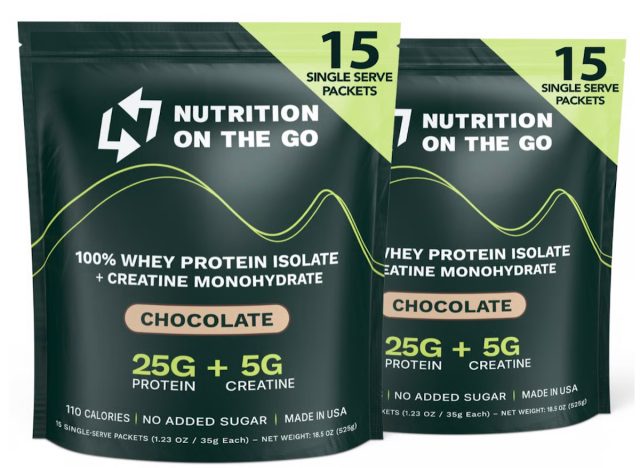
Calories: 110 in 1 packet (35g)
Fat: 1 g (Saturated fat: 0 g)
Sodium: 65 mg
Carbs: 1 g (Fiber: 0 g , Sugar: 0 g)
Protein: 25 g
Creatine is an ingredient you’ll see in many protein powders because it gives muscles energy, boosts strength and potentially supports brain health. While many take it to improve performance in the gym, “it’s important to know that creatine also increases water retention in muscle cells,” says Morris. She explains, “This can lead to temporary weight gain, increase the risk of dehydration, and may cause side effects like stomach discomfort or muscle cramping in some people. The International Society of Sports Nutrition recommends a safe and effective dose of 3–5 grams per day. However, not all products containing creatine are created equal.” And that’s why Nutrition On The Go Whey + Creatine is on this list, according to Morris. “Nutrition On The Go Whey + Creatine is one example where caution is warranted,” she says. “While it offers convenience and a portable option, the label claims to be “lab-tested” without providing any third-party certifications or details on quality assurance, which is a red flag.” Morris says, “Independent investigations, including those by The Clean Label Project, have shown that many protein powders contain detectable levels of heavy metals such as lead, cadmium, and arsenic.” She adds, “At $2.67 per serving, this product is expensive considering the lack of verified safety. As a dietitian, I recommend choosing protein powders that are third-party tested (e.g., NSF Certified for Sport) for transparency and quality. Trusted brands like Thorne also sell high-quality protein powders and offer creatine as a separate, verified supplement—making it easier to manage both safety and dosage”.